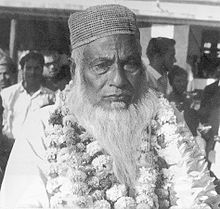Abdul Hamid Khan Bhashani
| Maulana Abdul Hamid Khan Bhashani | |
|---|---|
| মাওলানা আব্দুল হামিদ খান ভাসানী | |

Abdul Hamid Khan Bhashani
|
|
| Member of Parliament of Pakistan | |
|
In office 1954–1955 |
|
| Governor | Iskander Mirza |
| Member of Parliament of Bangladesh | |
|
In office 10 January 1973 – 15 August 1975 |
|
| President | Sheikh Mujibur Rahman |
| Personal details | |
| Born |
12 December 1880 Sirajganj, British India (modern day Bangladesh) & lived in Joypurhat |
| Died | 17 November 1976 (aged 95) Dhaka, Bangladesh |
| Resting place | Santosh, Tangail, Bangladesh |
| Nationality |
|
| Parents | Haji Sharafat Ali Khan (father) Mst. Mojiron Bibi (mother) |
Abdul Hamid Khan Bhashani (Bengali: মাওলানা ভাসানী;12 December 1880 – 17 November 1976) was a popular Islamic scholar and political leader in British India (now Bangladesh). He remained a rural-based politician renowned for selflessness and solidarity with the oppressed. His long political tenure spanned the British colonial India, Pakistan and Bangladesh periods.
He gained popularity among peasants and helped establish the East Pakistan Peasant Association. Owing to his leaning to the left, often dubbed "Islamic Socialism", he is also called "The Red Maulana".
An alumnus of Deoband, and participant of the Khilafat Movement protesting the dissolution of the Ottoman Empire he led the Muslims of Assam in a successful campaign during the 1947 Sylhet Referendum, through which Sylhet chose to become part of the Pakistan national project. He was the founder and President of the Pakistan Awami Muslim League which later became Awami League (AL). Later however, owing to differences with the right-leaning leaders in the AML, such as Shahid Suhrawardy, on the issue of autonomy for East Pakistan, he formed a new progressive party called National Awami Party (NAP). He also differed with Suhrawardhy when he as Prime Minister of Pakistan decided to join the US-led defence pact CENTO and SEATO. He disagreed with Pakistan's growing ties with the United States.
The split among the left-wing camp into pro-Moscow and pro-Peking factions eventually led to the breakup of NAP into two separate parties; the pro-Moscow faction being led by Muzaffar Ahmed. After Pakistan's 1965 war with India, he showed some support for Field Marshal Ayub Khan's regime for its China-leaning foreign policy; but later he gave provided leadership to a mass uprising against the regime in 1968–69 with support from Fatima Jinnah.
...
Wikipedia
